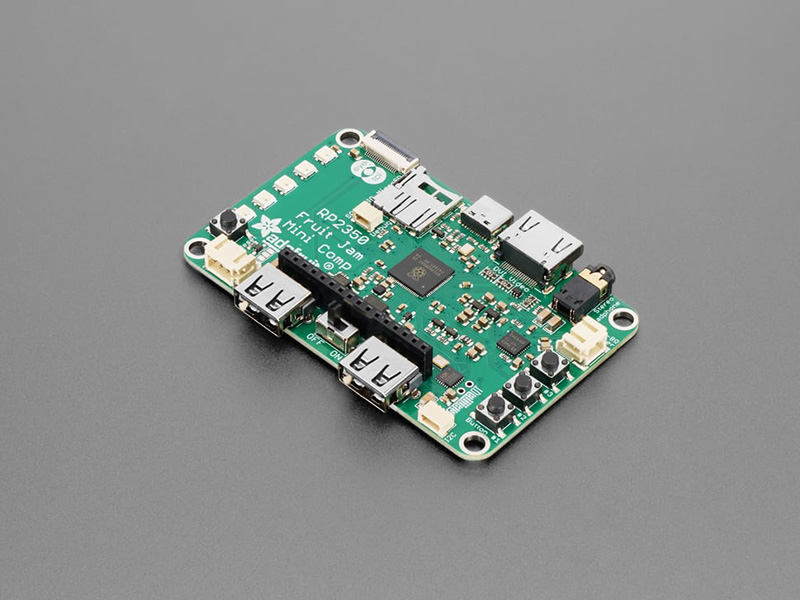
Fruit Jam - Mini RP2350 Computer by Adafruit
We were catching up on a recent hackaday hackchat with eben upton and learned some fun facts: such as the DVI hack for the RP2040 was inspired by a device called the IchigoJam. we remember reading about this back when it was an LPC1114, now it uses an RP2040. well, we’re wrapping up the Metro RP2350 and lately we’ve been joking around that with DVI output and USB Host support via bit-banged PIO, you could sorta build a little stand-alone computer.
Well, one pear-green-tea-fueled-afternoon later we tried our hand at designing a ‘credit card sized’ computer - that’s 3.375” x 2.125”, about the same size as a business card and turns out there’s even a standard named for it: ISO/IEC 7810 ID-1.
Anyhow, with the extra pins of the QFN-80 RP2350B, we’re able to jam a ridonkulous amount of hardware into this shape:
- RP2350B dual 150MHz Cortex M33
- PicoProbe debug port
- 16 MB Flash + 8 MB PSRAM - the PSRAM will help when we want do do things like run emulations that we need to store in fast RAM access, and also let us use the main SRAM as the DVI video buffer.
- USB type C for bootloading/USB client
- Micro SD card with SPI or SDIO
- DVI output on the HSTX port
- I2S stereo headphone + mono speaker via the TLV320DAC3100
- 2-port USB type A hub for both keyboard and mouse or game controllers
- Chunky on-off switch
- Stemma QT I2C
- Stemma classic JST 3-pin
- 5x NeoPixels
- 3x tactile switches
- 16-pin socket header with 10 A/D GPIO + 5V/3V/GND power pins.
Purchase
Contribute
Have some info to add for this board? Edit the source for this page here.
CircuitPython 10.0.3
This is the latest stable release of CircuitPython that will work with the Fruit Jam - Mini RP2350 Computer. Use this release if you are new to CircuitPython.
Modules included in this download
_asyncio _bleio _bleio (HCI co-processor) _pixelmap adafruit_bus_device adafruit_pixelbuf aesio analogbufio analogio array atexit audiobusio audiocore audiodelays audiofilters audiofreeverb audiomixer audiomp3 audiopwmio binascii bitbangio bitmapfilter bitmaptools bitops board builtins builtins.pow3 busdisplay busio busio.SPI busio.UART codeop collections countio digitalio displayio epaperdisplay errno floppyio fontio fourwire framebufferio getpass gifio hashlib i2cdisplaybus i2ctarget imagecapture io jpegio json keypad keypad.KeyMatrix keypad.Keys keypad.ShiftRegisterKeys keypad_demux keypad_demux.DemuxKeyMatrix locale lvfontio math memorymap microcontroller msgpack neopixel_write nvm onewireio os os.getenv paralleldisplaybus picodvi pulseio pwmio qrio rainbowio random re rgbmatrix rotaryio rp2pio rtc sdcardio select sharpdisplay storage struct supervisor synthio sys terminalio tilepalettemapper time touchio traceback ulab usb usb_cdc usb_hid usb_host usb_midi usb_video vectorio warnings watchdog zlibFeatures: STEMMA QT/QWIIC, USB-C, External Display, USB Host, Speaker
CircuitPython 10.1.0-rc.1
This is the latest development release of CircuitPython that will work with the Fruit Jam - Mini RP2350 Computer.
Alpha development releases are early releases. They are unfinished, are likely to have bugs, and the features they provide may change. Beta releases may have some bugs and unfinished features, but should be suitable for many uses. A Release Candidate (rc) release is considered done and will become the next stable release, assuming no further issues are found.
Please try alpha, beta, and rc releases if you are able. Your testing is invaluable: it helps us uncover and find issues quickly.
Modules included in this download
_asyncio _bleio _bleio (HCI co-processor) _pixelmap adafruit_bus_device adafruit_pixelbuf aesio analogbufio analogio array atexit audiobusio audiocore audiodelays audiofilters audiofreeverb audiomixer audiomp3 audiopwmio binascii bitbangio bitmapfilter bitmaptools bitops board builtins builtins.pow3 busdisplay busio busio.SPI busio.UART codeop collections countio digitalio displayio epaperdisplay errno floppyio fontio fourwire framebufferio getpass gifio hashlib i2cdisplaybus i2cioexpander i2ctarget imagecapture io jpegio json keypad keypad.KeyMatrix keypad.Keys keypad.ShiftRegisterKeys keypad_demux keypad_demux.DemuxKeyMatrix locale lvfontio math memorymap microcontroller msgpack neopixel_write nvm onewireio os os.getenv paralleldisplaybus picodvi pulseio pwmio qrio rainbowio random re rgbmatrix rotaryio rp2pio rtc sdcardio select sharpdisplay storage struct supervisor synthio sys terminalio tilepalettemapper time touchio traceback ulab usb usb_cdc usb_hid usb_host usb_midi usb_video vectorio warnings watchdog zlibFeatures: STEMMA QT/QWIIC, USB-C, External Display, USB Host, Speaker
Absolute Newest
Every time we commit new code to CircuitPython we automatically build binaries for each board and language. The binaries are stored on Amazon S3, organized by board, and then by language. These releases are even newer than the development release listed above. Try them if you want the absolute latest and are feeling daring or want to see if a problem has been fixed.
Previous Versions of CircuitPython
All previous releases of CircuitPython are available for download from Amazon S3 through the button below. For very old releases, look in the OLD/ folder for each board. Release notes for each release are available at GitHub button below.
Older releases are useful for testing if you something appears to be broken in a newer release but used to work, or if you have older code that depends on features only available in an older release. Otherwise we recommend using the latest stable release.
